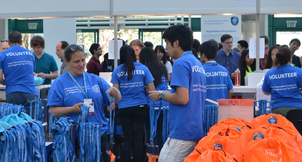| Submitted by: Frank J. Pokrywka, PhD, CIH Clean, fresh drinking water emanating from our tap is often taken for granted. This has become evident with concerns for “safe” drinking water in Houston, Florida, Mexico and the Caribbean in the wake of recent hurricanes and earthquakes. On October 26th, we explored what needs to be done to assure the water we drink, cool with, bathe in and use in our homes, schools and workplaces is free of contaminants that can make us sick. The first speaker for this meeting was Janet Stout, Ph.D., President and Director of Special Pathogens Laboratory in Pittsburgh who spoke on the IH issues of Legionella bacteria and other waterborne hazards affecting homes, hospitals, commercial and industrial buildings. Sources of exposure discussed included water fountains, cooling towers, ice machined, decorative fountains, showers, hot tubs, swamp coolers and other water aerosol sources having the proper temperature and mineral composition. Janet’s talk focused on the prevalence of pathogenic organisms in our water, possible treatment methods, Legionella legislation (ANSI / ASHRAE Standard 188-2015) and various monitoring methods. Our second speaker, Keith Rickabaugh, a Certified Industrial Hygienist from the RJ Lee Group in Monroeville and our local section Director, discussed the hazards of lead and other metal contaminants in drinking water and the possible health implications to our most susceptible populations. His talk focused on the sources of lead in water including lead service lines, solder joints, electrolysis interactions between copper, steel and lead lines, brass fixtures, and galvanizing coatings in light of current state and federal regulations. Keith also discussed other sources of lead exposure in our homes and workplaces and the risk to children from lead in drinking water as a part of the total potential exposures from lead paint and soil contamination. Proper sampling techniques were covered as were the current laboratory analytical methods. Our third speaker was Dr. Stanley States, a full-time Instructor on drinking water and wastewater with the Texas A&M University and the retired Director of Water Quality from the Pittsburgh Water and Sewer Authority. With the aid of various charts and photos, Stanley discussed the process flow of Pittsburgh’s water from the Allegheny River to our homes. He presented a thorough description of how drinking water is first filtered and chemically treated at the Aspinwal plant to remove debris, dirt, heavy metals and microorganisms, and how water is treated a second time as it flows from our reservoirs to our homes and businesses. Stanley also discussed the recent media reports of various chemical or physical treatments of drinking water in Flint, Pittsburgh and NYC; covering why the methods were or were not successful. Also discussed were some plumbing issues that may cause lead contaminated water such as transitions from public lines to private lines, protective coatings, dead legs, storage tanks, and pipe materials (copper vs PEX vs galvanized, brass, etc.) | Thanks to the following members who attended the event:
|
October 26th Meeting Highlights - Potable Water Safety: What an Industrial Hygienist Needs to Know12/6/2017
0 Comments
 The Intel International Science and Engineering Fair (ISEF), the world’s largest pre-college science competition, is returning to Pittsburgh in 2018 at the David L. Lawrence Convention Center. This competition brings together 1700 students in grades 9-12 from 75 countries, regions and territories. These are the best and brightest in the world, having won at local, regional, state and national fairs to get here. Twenty percent of competitors hold patents or published papers. We need your help! Approximately 1000 judges in 22 categories, covering the whole of science and engineering. Judges are required to have a B.A., B.S. or a master’s degree with a minimum of six years related professional experience OR a Ph.D., M.D., or equivalent. Senior level graduate students may also qualify. If in doubt apply, and credentials will be reviewed. Judges are expected to be available from Tuesday afternoon (register no later than 5:00 PM) May 15 through Wednesday evening May 16, 2018 to complete their judging assignments. Judge training is available. Parking and all meals are provided free. Judging at Intel ISEF is wonderful. The students consistently rank talking with the judges as the high point of their experience. The opportunity to meet these students is a tremendous experience for you. The positive energy in the exhibit hall with the students is inspiring! Judging is also a great opportunity to network with fellow judges - over 1000 professionals from around the region and around the world. The students are our future leaders and workers for industry, universities and research facilities – it’s an opportunity to meet your future students, colleagues and employees. You will also advance STEM education, and promote good will. Intel ISEF was held in Pittsburgh in 2012 and 2015, and was a huge success. Join us to help make the 2018 fair even better. Become a judge. It’s easy. Go to https://student.societyforscience.org/grand-award-judges - click Apply to be a Grand Awards Judge at Intel ISEF 2018 in Pittsburgh! Don’t want to judge? Volunteer to help. There are all kinds of jobs to do, including being an interpreter in any of 20 languages. Go to: https://student.societyforscience.org/volunteers to learn more. Questions? Email: [email protected] Lisa M. Kosick Director, Covestro Pittsburgh Regional Science & Engineering Fair, Coordinator, Chain Reaction Contraption Contest and Future City Competition Phone 412.237.1534 Fax 412.237.3375 Carnegie Science Center One Allegheny Avenue Pittsburgh, PA 15212 |
Archives
September 2022
|
